News
May 9, 2019
Environmentalists warn of imminent drinking water pollution for people living in the municipalities of Bled, Gorje, Žirovnica and Radovljica, whose water source is situated at Ovčja jama water protection area in Pernik.
Water originating from Triglav National Park is, or rather, should be, among that with the best quality in the entire country. Nevertheless, water coming from Pernik now has added chlorine since contamination with faeces was discovered several years ago due to the spread of farming on Mežakla and cutting down of the forests.
This April, a passer-by noticed a loaded truck from a construction company from Kranj driving up in Mežakla and unloading what appeared to be construction waste soil into a sinkhole in the otherwise pristine nature of a protected water area.
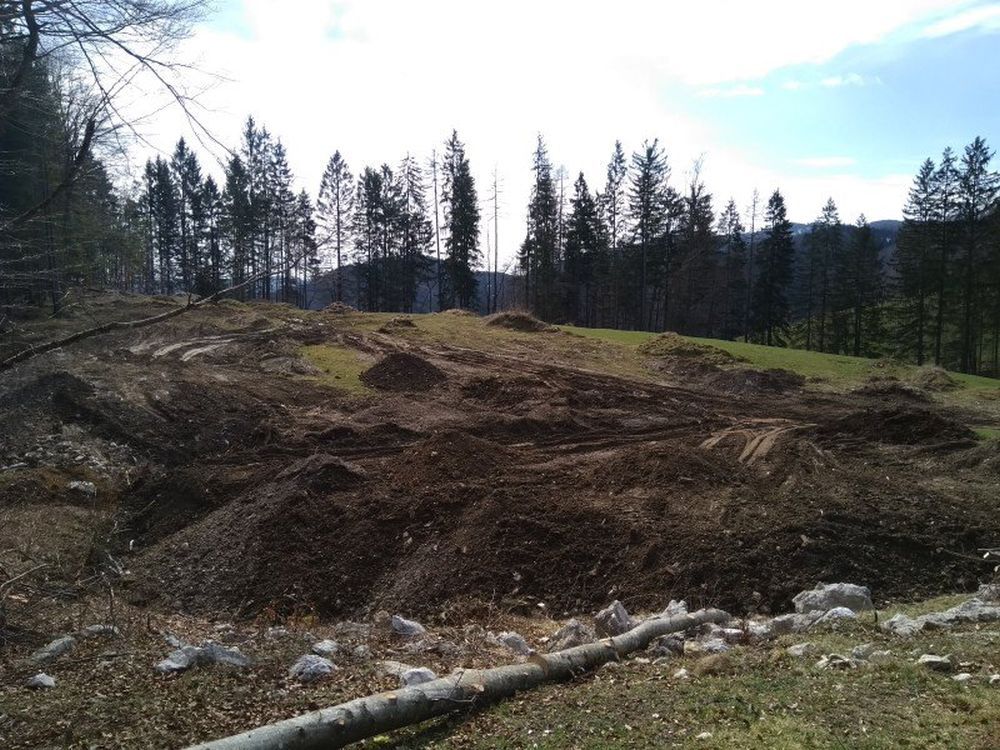
Bled Environmental Protection Society immediately informed the relevant authorities. The same day an inter-municipal inspector managed to catch the driver in action, and prevent any further dumping of the problematic soil.
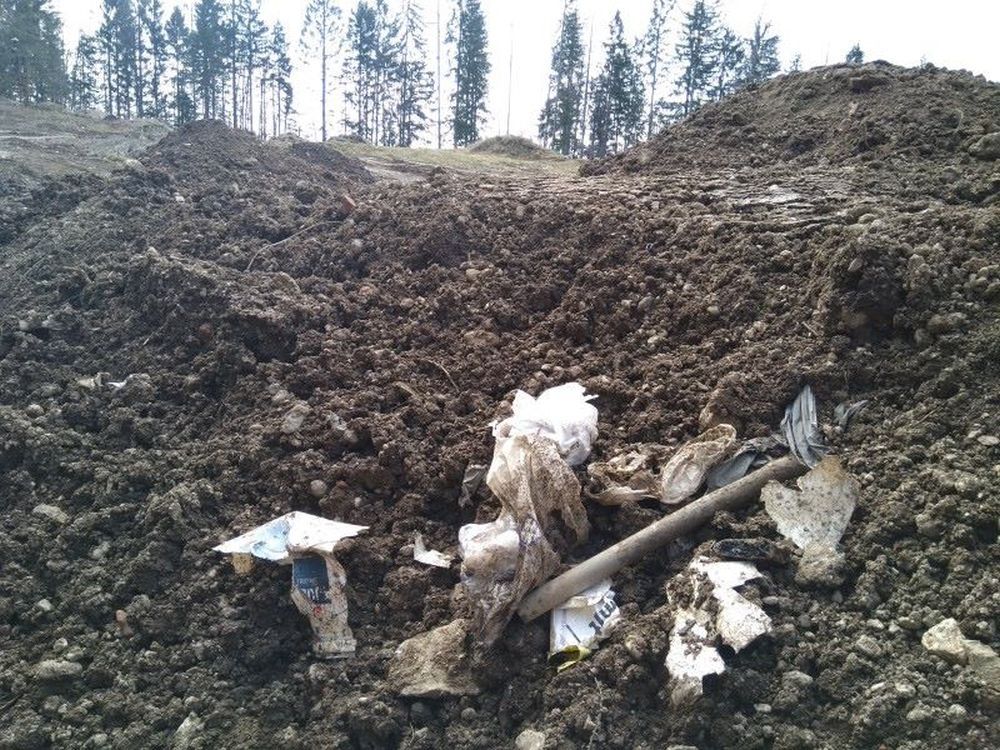
When a few days ago the camera team of the national broadcaster headed to the site to take footage of the waste, the owner of the land first almost ran over the journalists with an excavator, then jumped out and scare them away with a pickaxe. The journalists called the police while the landowner and his son allegedly spent the night in a psychiatric ward in Begunje, claiming insanity.
The inspector ordered the problematic waste soil to be removed by the company that brought it there, while special supervision of the company’s activities has also been launched.
The problematic soil, which includes plastic, plaster, adhesives, concrete, asbestos plates and asphalt, according to the Bled Environmental Protection Society, for now remains where it is. However, according to colourant marker studies, conducted by the Faculty of Natural Sciences and Engineering of the University of Ljubljana, water from the problematic area in Mežakla can trickle down the karst floor to the drinking water wells area in a mere 13 hours.
STA, 9 May 2019 - A 79-year-old man working in his vineyard around the south-eastern town of Črnomelj on the border with Croatia was kidnapped on Wednesday by a group of migrants who entered Slovenia illegally, the police told the press in Ljubljana on Thursday.
A 25-year-old Morocco citizen and two 18-year-olds from Algeria were arrested by the Italian police in the town of Basovizza last evening and returned to Slovenia.
They are in detention on suspicion of kidnapping and theft, and will be brought before an investigating magistrate within 48 hours, said Tomaž Perošlja from the General Police Department.
Under Slovenia's penal code, kidnapping carries a prison sentence from six months to five years, or less if the kidnapper releases the victim of their own accord.
Peršolja explained the man had been tied up near the village of Mali Nerajec in the Bela Krajina region in early afternoon, put into his car's boot and driven several hours around Slovenia before being untied and released in a village near the town of Sežana on the south-western border with Italy.
The kidnappers took his documents before proceeding to Italy. Upon release, the man asked for help the nearby locals, who called the police and his family after 6pm.
The police have also established that the three foreign citizens were processed by Slovenian police before, according to Peršolja.
They entered the country illegally on 29 April, did not express an intention to ask for international protection in Slovenia and were returned to Croatia on 30 April.
The kidnapped man's daughter told the news portal siol.net yesterday her father, who was not injured, had been kidnapped by four migrants.
Pršolja explained police were still trying to establish all the details, saying it was possible the fourth kidnapper had left the car earlier.
The police, which have already beefed up control at the most sensitive border areas, are still searching for him.
The incident could further heat the debate on safety along the border due to a rise in illegal migrations, especially during the ongoing campaign for the EU elections.
Two civil groups from Bela Krajina and the municipality of Ilirska Bistrica, which have been warning about poor safety of local population, will hold a news conference at 2pm, also featuring the kidnapped man's daughter.
Meanwhile, the opposition Democrats (SDS) have already demanded a session of the National Security Council to discuss the situation on the southern border.
As party leader Janez Janša said on Twitter this morning, the government was not in control of the situation and did not it take it seriously.
STA, 8 May 2019 - Impol, Slovenia's largest maker of aluminium products, launched a new car industry production line in its subsidiary TLM in Croatia on Wednesday, consolidating its position in the car industry market.
The cost of Impol's investment amounted to EUR 6.5 million, with the new combination cutting line enabling the company to expand its cold rolling mill production as well as the production of a wider variety of new products intended for industrial customers and specialised car and aircraft industry markets.
The construction works started in August 2018, while the trial production period began in April this year. The regular production is expected to be launched soon.
The company's latest line, entitled Salico, will enable the processing of aluminium products, spanning in depth from 0.5 to 6 mm and with the maximum width of 1,600 mm.
The line's top speed is 200 m per minute, which is at least six times faster than before, according to the project's manager Damir Muhedinović.
Impol's CEO Andrej Kolmanič stressed the importance of the investment for attracting and serving final customers consuming the biggest amount of aluminium products and requiring the highest quality standards.
The Šibenik-based company TLM, which was acquired by the Slovenska Bistrica-based company in 2017, employs more than 400 people, manufacturing some 9,000 tonnes of aluminium products per month. Until 2025 the subsidiary would like to double its production to 200,000 tonnes per year.
Impol has invested more than EUR 100 million in TLM and plans to keep investing, expanding its production capacities.
Last year, the company produced the best results, generating more than EUR 36 million in net profit, while increasing its production volume by 4%, according to the newspaper Delo.
The opening of the new line was attended by Economy Minister Zdravko Počivalšek, Slovenian Ambassador to Croatia Smiljana Knez and the Croatian Economy Ministry State Secretary Mario Antonić.
The latter said the investment demonstrated that business transcended state borders, while Počivalšek confirmed that the economic cooperation between Slovenia and Croatia was successful. Trade between the countries amounted to EUR 5.5 billion in 2018.
He also welcomed Impol's investment, saying it would contribute to the bilateral trade and to the countries' performance in the EU and global economic market, reported the Šibenik news portal.
Počivalšek also pointed out that Slovenia invests the most in Croatia, with Slovenian investments amounting to EUR 1.8 billion at the end of 2018, a 12% increase year-on-year.
Croatia invested in Slovenia EUR 923 million in 2018, a 3% increase year-on-year.
STA, 8 May 2019 - The Slovenian economy as a whole significantly improved its performance last year, with total net profit of companies increasing by 16% and total revenues by 9%, according to the Agency for Public Legal Records (AJPES).
The total net profit posted by Slovenian companies surpassed the total loss for the fifth year in a row in 2018, standing at EUR 4.2 billion, up 16% year-on-year.
The 66,749 companies which submitted their business results for last year to AJPES meanwhile increased their combined revenue by 9% to EUR 100.8 billion.
Revenues generated on the foreign markets amounted to EUR 40.7 billion, which is 10% more than in 2017.
Slovenian companies also hired new employees at a facilitated pace last year, with the number of employed persons measured by hours worked increasing by 29,517 compared to 2017 to 503,326.
Employees received an average wage of EUR 1,652 gross last year, or EUR 65 gross more than in 2017. Net added value per employee was up by 2% to EUR 44,415.
AJPES will present a more detailed analysis of annual reports of Slovenian companies at a press conference next week.
STA, 8 May 219 - Slovenia has remained the fifth most attractive destination for German investors among 15 countries of Central and Eastern Europe (CEE), while 80% of German investors would reinvest in the country, which is 16 percentage points less than last year, the latest survey by the Slovenian-German Chamber of Commerce has shown.
Chamber president Gertrud Rantzen said at Wednesday's presentation of the survey that CEE was one of the most important economic regions for Germany, where the country's companies found a lot of partners and investment destinations.
Rantzen noted that Slovenia had kept its ranking in terms of attractiveness for German investments, but that it must not rest on laurels. Slovenia is trailing only the Czech Republic, Poland, Slovakia and Estonia in the region.
"The other countries are not sleeping, some of them have made strong progress and them overtaking Slovenia is only a matter of time," she added.
Slovenia's biggest shortcomings have remained the same - tax burden, tax system and authorities, high labour costs and rigid labour legislation. The situation on the labour market is also deteriorating, as the available labour force is shrinking.
The survey shows that despite the shortcomings of the Slovenian business environment, 80% of German investors would pick the country again as a location for their investments, which is however a drop compared to last year (96%).
Rantzen thus called for better training of employees, a migration policy which would attract foreign experts, and the promotion of apprenticeship. She again called on the government to introduce a cap on social security contributions.
The chamber has also noticed progress in Slovenia in certain fields, with the economic, political and social stability improving.
Investors have assessed the country's economic policy as more predictable, legal security has also improved, and Slovenia is also standing out in terms of infrastructure in the positive sense, Rentzen added.
Slovenia's score in transparency of public procurement and quality of academic education has also improved, and the country decisively leads the 15 countries as the top destination for research and development.
Slovenia has been the fastest growing economy in the region since 2016, with 68% of the surveyed German companies assessing the current economic situation in the country as good, and 28% as satisfactory.
Only 17% of the respondents expect that Slovenia's exports will increase next year, and 62% that they will stay level. "Certain sectors are stagnating, automotive suppliers in particular," said Rentzen.
One-fifth of the surveyed companies want to increase their investments in Slovenia, 52% will keep their investment plans for 2019 as they are. Total German investments in Slovenia are expected to stand at EUR 557 million by 2022.
A majority of the planned investments will go for digitalisation and expansion of production. There will also be more investments in education and training of workforce and the development of products, the survey shows.
STA, 8 May 2019 - The opposition Democrats (Slovenska demokratska stranka, SDS) have initiated a motion to exclude healthcare and the army from the uniform system covering wages across the entire public sector, in what could be the dismantling of a complex scheme put in place by an SDS-led government in 2008.
A decade after it was established the system is causing dissatisfaction, in particular when it comes to incentivising the best performers and those with the biggest workload, SDS deputy Jelka Godec told the press on Wednesday. "The most severe anomalies, discrepancies and warnings come from defence and healthcare," she said.
The SDS demands an emergency session of parliament to debate its motion. It proposes that the government prepare an analysis of the system complete with a set of proposals on how to tackle them, which should include the possibility of excluding healthcare and soldiers from the single system.
Janez Janša, the leader of the SDS, wrote on Twitter yesterday that "after 11 years you can see from the Moon what works and that doesn't". He said the single pay system should be preserved for the public administration but "healthcare, the army, police... must go their own way".
The motion comes in the midst of one of the most severe crisis in healthcare, which is faced with the prospect of dozens, perhaps even hundreds of general practitioners leaving the public system due to what they claim are unreasonable workloads.
At several community health centres around the country most if not all GPs have handed their notices in a final escalation of tensions with the government and the public health insurer ZSSS.
In Kranj, one of the areas hit the worst by the doctors' action, almost all GP offices are closed as the doctors use up their remaining holiday days before their notices become effective, leaving the emergency service to do the work of GPs, which has led to long waiting times.
In recent weeks the government has been scrambling to come up with a solution that would be financially sustainable while also placating the doctors, but at this point a solution is not in sight.
The SDS motion dovetails with the demands of doctors, who have long argued that the single pay system is too restrictive, even as they managed to win considerable pay rises in the last few years above what other public sector employees have received.
One trade union of doctors, Praktikum, was even found to have egged on doctors to quit in order to force community health services to hire them as sole proprietors, which would liberate them from some of the bureaucracy while removing any pay restrictions.
But many in government fear any one portion of the public sector leaving the single pay system would lead to its collapse and trigger unbridled pay demands across the public sector that may jeopardise the stability of public finances.
Alenka Forte, who heads the SDS's health committee, however said today that exclusion of healthcare from the single pay system would be "a condition without which it is impossible to start improving Slovenian healthcare."
"Those who want improvements in healthcare must stop with ideology, they should not compare us to Venezuela. We need to look at best practices in the EU and start working on making healthcare serve the patients," she said.
The Public Administration Ministry said in a response that individual profession groups or parts of the public sector leaving the uniform system was not a guarantee that their pay would be regulated in a more appropriate way.
The ministry said that the SDS probably assumed that partial negotiations would make it easier for an individual profession group to get higher pay.
It meanwhile believes that the uniform system provides better possibilities for rewarding best performers and those with the biggest workload. It will soon present to public sector trade unions and negotiate relevant changes to the system.
The ministry also noted that Public Administration Minister Rudi Medved and PM Marjan Šarec had stressed on several occasions that the exit of one or more profession groups from the system could cause it to collapse.
The system would become non-transparent and hard to manage, it said, adding that the "assessment that the wage bill for public sector employees would increase even further is justified."
Bookmark this link and find the headlines faster each morning, or follow us on Facebook
A schedule of all the main events involving Slovenia this week can be found here
Visiting Ljubljana? Check out what's on this week, while all our stories on Slovenia, from newest to oldest, are here
This summary is provided by the STA:
EBRD keeps GDP growth forecast for Slovenia at 3.3%
NICOSIA, Cyprus - The European Bank for Reconstruction and Development (EBRD) has kept its GDP growth forecast for Slovenia at 3.3% in its spring report. The Slovenian economy is expected to expand by 2.8% in 2020. The latest GDP growth forecasts indicate Slovenia's economy will expand at around 3.4% this year and roughly 3% in 2020. The European Commission has also kept its forecast for Slovenia unchanged at 3.1% for this year and 2.8% for 2020 in its spring forecast.
Remaining executive posts at BAMC filled
LJUBLJANA - Andraž Grum and Bojan Gantar were appointed new executive directors of the Bank Assets Management Company (BAMC) by the non-executive directors, to make the executive management complete after Matej Pirc was appointed CEO in April. They are expected to assume their duties at the end of the month when the board of directors assigns the areas of their responsibility. BAMC's board has been completely overhauled in recent months in the wake of an internal audit which found issues with the sale of land to Swiss Lonstroff for an elastomer plant in Logatec, and several other allegations.
Slovenian economy as a whole improves key indicators in 2018
LJUBLJANA - The Slovenian economy as a whole significantly improved its performance last year, with total net profit of companies increasing by 16% and total revenues by 9%, according to the Agency for Public Legal Records (AJPES). The total net profit posted by Slovenian companies surpassed the total loss for the fifth year in a row in 2018, standing at EUR 4.2 billion, up 16% year-on-year. The 66,749 companies which submitted their business results for last year to AJPES meanwhile increased their combined revenue by 9% to EUR 100.8 billion. Revenues generated on the foreign markets amounted to EUR 40.7 billion, which is 10% more than in 2017.
Slovenia stays 5th best investment destination in SEE for Germans
LJUBLJANA - Slovenia has remained the fifth most attractive destination for German investors among 15 countries of Central and Eastern Europe (CEE), while 80% of German investors would reinvest in the country, which is 16 percentage points less than last year, the latest survey by the Slovenian-German Chamber of Commerce has shown. Slovenia's biggest shortcomings have remained the same - tax burden, tax system and authorities, high labour costs and rigid labour legislation. Also, the available labour force is shrinking. Slovenia is trailing only the Czech Republic, Poland, Slovakia and Estonia in the region.
Joining EU made Slovenia better, PM says
BRDO PRI KRANJU - Slovenia made the right decision by joining the EU 15 years ago, Prime Minister Marjan Šarec said as he addressed a ceremony marking this anniversary. His Luxembourg counterpart Xavier Bettel, who also addressed the event, praised Slovenia as a reliable and trustworthy partner and the voice of reason advocating for closer ties within the EU.
SDS proposes dismantling public sector pay system
LJUBLJANA - The opposition Democrats (SDS) have initiated a motion to exclude healthcare and the army from the uniform system covering wages across the entire public sector, in what could be the dismantling of a complex scheme put in place by an SDS-led government in 2008. The system is causing dissatisfaction, in particular when it comes to incentivising the best performers and those with the biggest workload, SDS deputy Jelka Godec told the press. The Public Administration Ministry said in a response that individual profession groups or parts of the public sector leaving the uniform system was not a guarantee that their pay would be regulated in a more appropriate way.
SDS, Left challenging changes to criminal procedure act
LJUBLJANA - The deputy groups of the opposition Democrats (SDS) and the Left filed a request for a constitutional review of the changes to the criminal procedure act which were passed on 26 March. They oppose the provisions on the use of covert investigative methods, and the obtaining of data on mobile traffic and financial transactions, which they believe breach people's privacy. They propose that the Constitutional Court suspend the implementation of the law pending its decision, annul the contentious provisions and task the government and parliament to present a new motion within two months.
Aluminium products maker Impol starts new production line in Croatia
ŠIBENIK, Croatia - Impol, Slovenia's largest maker of aluminium products, launched a new car industry production line in its subsidiary TLM in Croatia, consolidating its position in the car industry market. The cost of Impol's investment amounted to EUR 6.5 million, with the new combination cutting line enabling the company to expand its cold rolling mill production as well as the production of a wider variety of new products intended for industrial customers and specialised car and aircraft industry markets. The Šibenik-based company TLM, which was acquired by the Slovenska Bistrica-based company in 2017, employs more than 400 people, manufacturing some 9,000 tonnes of aluminium products per month
Journalists tried over leaks related to Mercator takeover
LJUBLJANA - The newspaper Dnevnik, its former editor-in-chief Suzana Rankov and three of its former journalists were put on trial for publishing in 2013 leaked transcriptions of phone calls of Tomaž Lovše, who acted as an advisor to Croatia's Agrokor in the takeover of Mercator. The defendants, who are charged with abuse of personal data, pleaded not guilty at today's pre-trial arraignment. The Slovenian Journalists' Association (DNS) condemned the case as a form of pressure on journalists and their sources.
All set for popular memorial walk in Ljubljana
LJUBLJANA - Commemorating the liberation of Ljubljana at the end of the Second World War, tens of thousands will take a walk along a marked gravel path surrounding the city on Saturday. A barbed wire used to trace the path during WWII, when Ljubljana was occupied first by Italian and then German forces. The 63rd Walk along the Wire event will kick off already on Thursday, when kindergarten children will set out to conquer a part of the hike, followed by primary and secondary school children on Friday. The commemoration's highlight will be Saturday's hike as well as the run of three-member teams.
Druga Godba world music festival to entertain Ljubljana and Maribor
MARIBOR - Druga Godba, a festival of world music, will kick off in Ljubljana on 21 May and run until 25 May, when it will move to Maribor too. The event will feature 16 concerts of various music genres performers from eleven countries, including the acclaimed US experimental guitarist and composer Yonatan Gat and popular Ukrainian folk quartet DakhaBrakha. Visitors will also be able to enjoy the beats of the London-based Afrobeat band Kokoroko or groove to the sounds of the leading Polish jazz musician Maciej Obara. A Slovenian higlight will the 25th May performance of Bakalina Velika in Maribor.
Slovenia has three wine regions. Podravje (the Drava Region), to the northeast; Posavje (the Sava Region) in the southeast; and Primorje (the Littoral), in the west, by the coast and Italy, including the famed Goriška Brda. The country also has seven native wine varieties: ranfol, žametna črnina (aka Blauer Kölner), rumeni plavec, zelen, pinela, vitovska grganja and rebula.
But I didn’t know that before I attended this event, organised by WineTasting Ljubljana. Or if I once did, briefly while the words flashed before my eyes or rung in my ears, then I forget. I only know it now because I took notes.
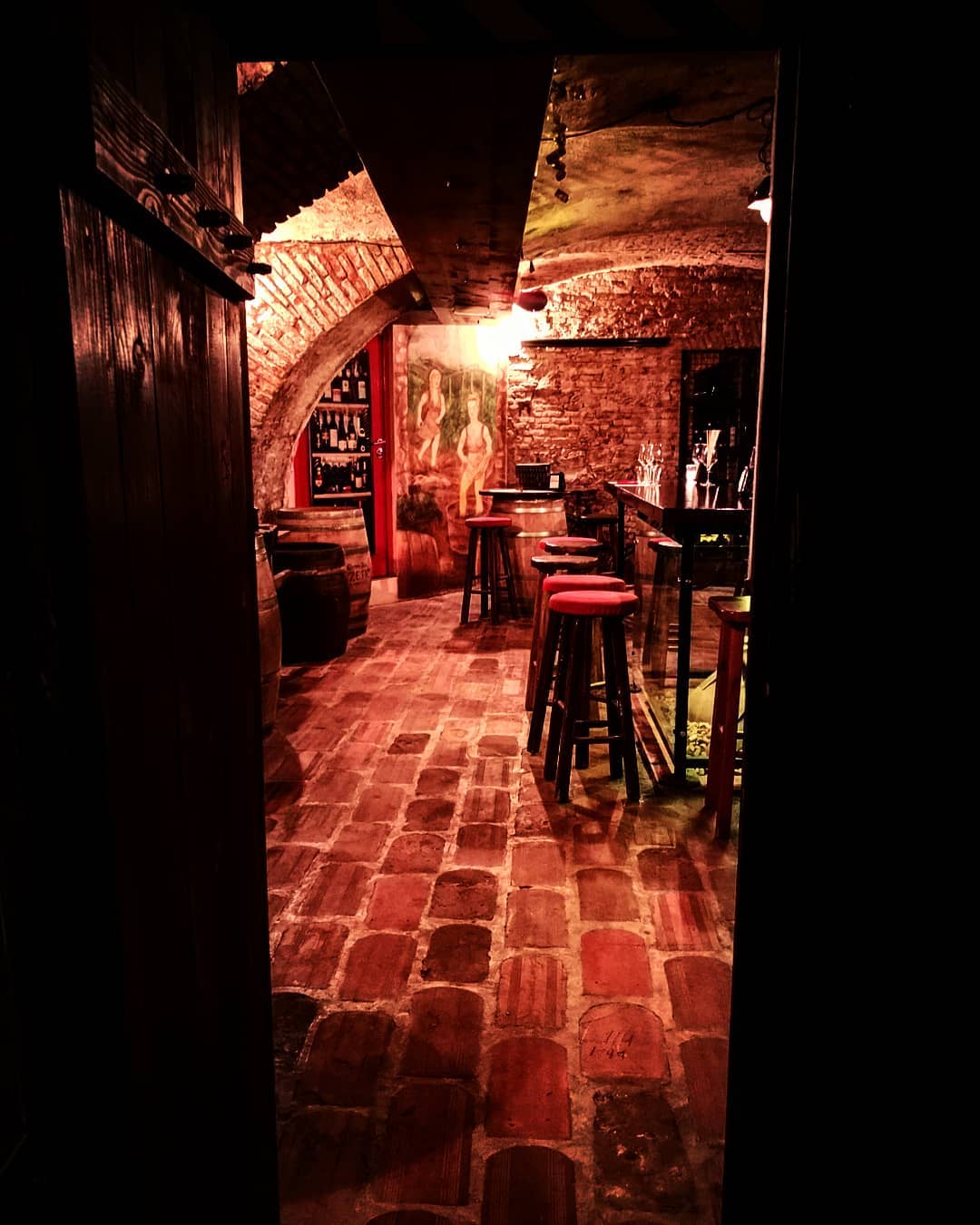
The wine celler under Dvorni Bar
A Slovenian wine tasting holiday in one evening
So in some ways I’m the ideal person for the wine tastings offered each evening by Wine Tasting Ljubljana. These don’t take you deep into one variety, but instead offer a tour of the country’s viticulture in seven glasses, one for each of the native varieties, with your guide (in my case the sommelier Boris Vukobrat), talking your through the experience.
Or as Boris put it: “You will drink, I will tell you stories.”
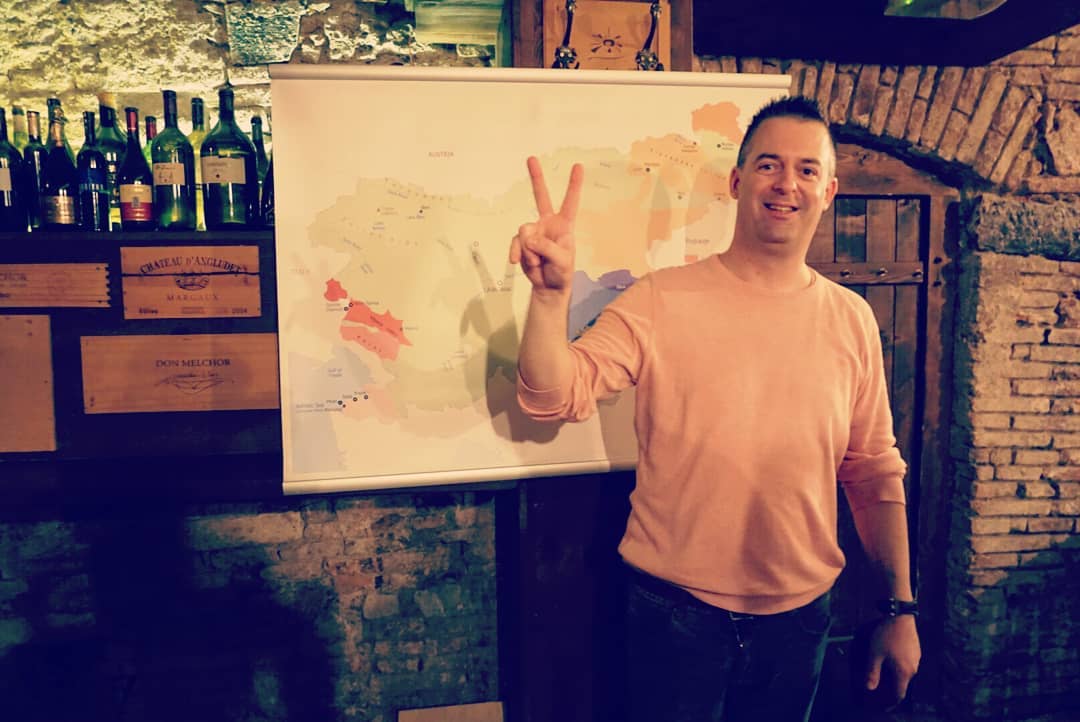
Boris - "The problem with Slovenian wine isn't quality, it's quantity. We don't really produce enough to export, so the best place to drink it is Slovenia."
The tastings take place in a 300-year old wine cellar beneath Dvorni Bar, just off Kongresni trg / Zvezda Park, and last for about 90 minutes. Whatever the weather outside, down in the cellar it’s cool and dim, with low lighting and candles giving the event a sense of occasion. There’s a map on the wall that Boris uses to show where the bottles come from, and some snacks on the table – cheese, olives, dried fruit, nuts, and pumpkin oil – to complement the wines, along some water and bread to cleanse the palate.
Boris knows his stuff, and also runs the same events in Bled, so I learned a lot. The evening starts with a light white, rebula, the kind of that’s dangerous because the low acidity means you can easily drink too much. It then moves to heavier whites, through a surprise wine (which we taste blindfolded), then into heavier reds, and ends with a dessert wine.
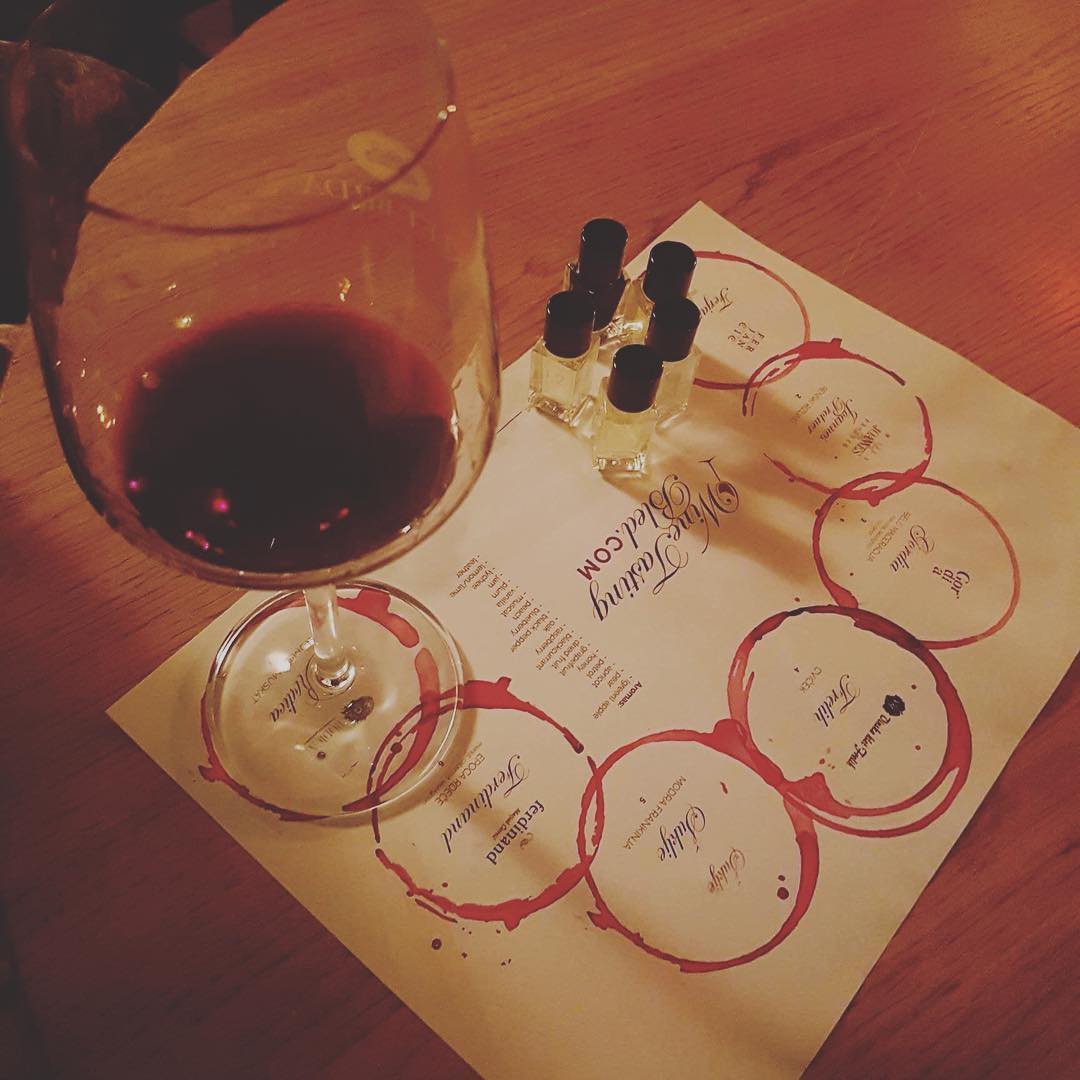
When each is poured, but before you drink it, Boris explains the some of the history and present of the wine, it’s relationship with the land, what to look out for when sampling it, and some suggested food pairings. You take your time and hold the glass up the light, swirl it around to see “the legs”, inhale the aromas – if there’s no vanilla, it was stored in steel; if there’s vanilla then in oak; if it smells like petrol then you’re drinking Riesling (one hopes). You’ll also learn some practical tips, perhaps the most important being that a low sulphur content means less risk of a hangover.
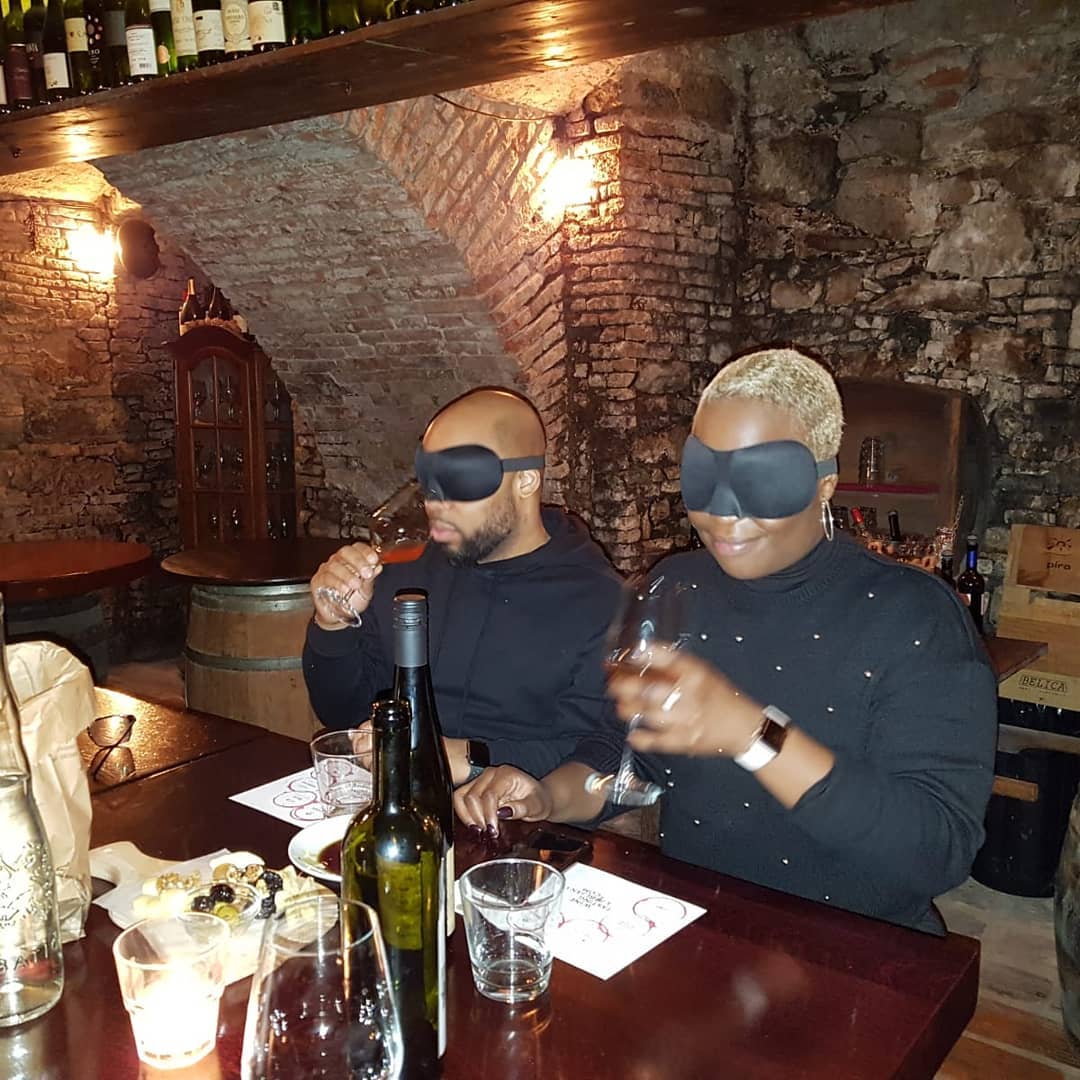
If you’re like me, and tend to drink too fast, anxious to find whatever magic is hiding at the bottom of a bottle, then the experience is a novel and enjoyable one. It’s nice to take things slow and have your hand held, to have someone help you stop and smell the flowers, vanilla, grapefruit, blackcurrant, lychee or gasoline, with one part of the tasting being a round of smelling certain concentrated aromas and trying to guess what they are. Being told the story of the wine and what to look out for before sampling it also primes you to be more attentive, to savour each inhalation or sip – to get more out of wine, and thus more out of life.
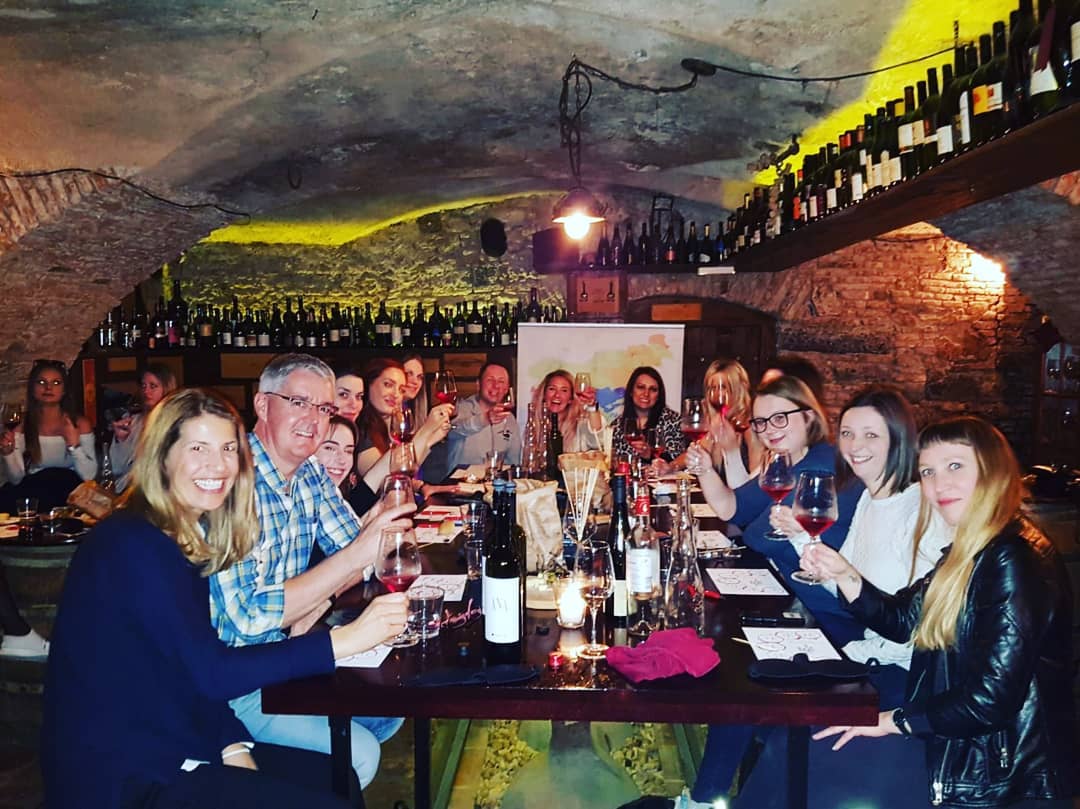
The glasses aren’t full pours, and you’re unlikely to get drunk, but if attending a 17:00 tasting you’ll leave at around 18:30 with a pleasant warmth, more joy and greater enthusiasm, making this a great start to a longer evening of fun. You’ll also have been taken on a short tour Slovenian wine varieties and regions without having to leave the centre of Ljubljana, and be able to order a glass or a bottle with more confidence.
To that end, Dvorni Bar itself, where the cellar and tastings are located, is a great place to carry out more in-depth research, with hundreds if not thousands of bottles. (I had a tiny after-wedding party there, spent over €400 and remember nothing but my wife’s name, but next time I’ll take notes.)
You can book a your place with Wine Tasting Ljubljana on the website, by email or phone (00386 41 90 50 70), and if you’re staying in Bled the same group does a similar event there (details)
All our stories on wine in Slovenia can be found here
May 8, 2019
You might know of Klemen Slakonja from his international hit Putin Putout that rocked YouTube in 2016, and with 23 million views is perhaps the most successful Slovenian video on the platform to date.
Slakonja, originally from Brežice, started his impersonating career somewhere in high school, then studied at the Academy for Theatre Radio Film and Television, and fooled around on the local Radio Energy in Krško. In the late summer of 2007, he performed at the welcoming ceremony for a hammer thrower, Primož Kozmos, who was returning silver from the World Championship in Osaka. There, Slakonja was spotted by a national radio journalist, who notified Sašo Hribar, the main host of the popular Radio Ga-Ga Show, of the young talent.
Slakonja accepted the invitation and performed on the show several times side-by-side with the current Slovenian prime minister, Marjan Šarec. Below is an excerpt from his first appearance. The plot of this show was the funeral of Angela (one of the show's recurring characters):
In 2008 he landed his first job as a TV host, in a popular family Sunday afternoon show called NLP on RTV 1. In 2011 he hosted his first EMA show, which chooses the Slovenian entry for the Eurovision Song Contest, and did so again in 2012 and 2016.
From 2013 to 2014 he hosted two of his own comedy shows for commercial TV stations, namely Zadetek v petek (Full on Friday) and Je bella cesta (Damn). Below is an example from one of these shows, in which he is impersonating Modrijani, a Slovenian oompah band, while the song talks about the uptight, obscenity free culture of the Slovenes, in which everyday words hint at sexuality.
2016 was the year of a big international breakthrough for Klemen Slakonja, when his Putin Putout YouTube video went viral, which was followed by much-viewed parodies featuring Angela Merkel and Donald Trump.
Also in 2016, Klemen Slakonja played himself as an aspiring serious actor turned popular entertainer due to public demand in a play Ubu the King, directed by Jernej Lorenci and produced by Slovenian National Theatre Drama.
Although Klemen obviously needs some rest, we hoped he would at least appear during the Eurovision Song Contest later this month, announcing Slovenia’s “points” to Tel Aviv and perhaps cracking a joke or two while doing so. After all, he managed to post a rather raw but funny parody of this year’s Slovenian entry “Sebi” on his Facebook in March. The job went to Lea Sirk instead, who might not be able to hide her disappointment if Zala Kralj & Gašper Šantl win.
You can see all of Klemen’s videos on his YouTube channel, here.
STA, 8 May 2019 - The parties standing in the upcoming EU election have very different views on the issue of migration, which the EU has been struggling with in recent years. While coalition parties mostly advocate for a common EU migration policy and sharing the burden, the opposition, bar the Left, want better border protection.
The senior coalition Marjan Šarec List (LMŠ) as well as the junior coalition Modern Centre Party (SMC) believe in solidarity.
The SMC thinks quotas are one of the possible solutions to the current situation, while the LMŠ believes a balance between solidarity towards migrants and the safety of Slovenian citizens should be found.
Both parties believe the problem of people leaving their countries should be tackled at its source, with the LMŠ noting a clear distinction should be made between legal and illegal migrations.
The coalition Social Democrats (SD) have told the STA that a united pacifist foreign policy of the EU would be crucial to deal with migration, along with protection of external EU borders.
Also important will be fair trade and a high level of environment protection and labour standards, the SD believes.
The party thinks countries share the responsibility for the situation and should also share the burdens.
The coalition Alenka Bratušek Party (SAB) agrees. "No country will be able to deal with this challenge alone and border fences will not stop immigration."
The Pensioners' Party (DeSUS), another ruling coalition party, thinks the migration influx has caught the EU completely unprepared.
"Each country took its own steps and what we witnessed at the end of 2015 is a disgrace for all of us who believe that Europe is a humane and civilised community," it says.
The opposition Left thinks the EU's foreign policy and its policy towards neighbouring countries need a thorough overhaul. Rather than building fences, buying weapons and gathering troops, the EU should invest in peace building in its neighbourhood, the party stresses.
"These people are fleeing from hunger, poverty, wars, ecological disasters," the Left has said about migrants.
In contrast, the opposition Democrats (SDS) and the non-parliamentary People's Party (SLS), running on a joint ticket, think the EU has made the right call when it recently decided to send 10,000 police officers at its external borders.
The SDS+SLS alliance believes the migration issue should be tackled in source countries and opposes obligatory refugee quotas for EU member states.
The opposition National Party (SNS) has even more radical views, calling for immediate closure of EU borders for all migrants.
The party also thinks all those who are already in the country and do not meet the criteria for residence should immediately be sent back to their countries.
The opposition New Slovenia (NSi) thinks the main problem is the lack of dialogue between central and western Europe.
"We need a European solution that will not breach the sovereignty of countries. We cannot have one Europe and two migration policies and two interpretations of the rule of law."
The issue of migration should primarily be addressed by tackling economic and social problems in source countries, the NSi believes.
Among the non-parliamentary parties and lists, the Homeland League (DOM) holds the most radical view, demanding that the EU protect its borders using all means available and prevent illegal migration from the Middle East and Africa.
The far-right United Slovenia, led by the self-styled militia leader Andrej Šiško, even talks of a "planned genocide against European nations" which started with the 1975 Strasbourg resolution. It claims that with the resolution, the EU predecessors agreed to accepting Arab immigrants in exchange for access to oil.
All our stories on the EU elections are here, while those on immigration are here
With Slovenia an official European Region of Gastronomy for 2021, and the tourist board putting its weight behind the promotion of the country’s food and drink offerings, the gourmet traveller or resident can expect to be bombarded with recommendations over the next two years of dishes to try, and places to go. While some of these lists will be thrown together by people who’ve just scanned a review website, or paid a fleeting visit to the country to tick off the most famous names, the same cannot be said for The Slovenia Restaurant Awards (TSRA).
The best fine-dining restaurants in Slovenia
Started in 2016, the winners of TSRA are chosen by an expert panel of Slovenian gourmets and foodies, who know the scene well and are always on the lookout for new talent, as well as returning to acknowledged leaders in fine dining. There’s also a popular element to the selection, with a public vote for the best restaurant in the country.
This year’s winners were announced on Tuesday evening, with the top three, as chosen by an expert panel, being named as Gostilna pri Lojzetu in Vipava, Hiša Franko in Kobarid and Vila Podvin in Radovljica. Hiša Franko – home to perhaps the most famous Slovenian chef, Ana Roš – also won the popular vote.
In addition to the three overall “best in Slovenia”, the event also gave awards by region with, unsurprisingly, some of the same names also appearing.
Alpine region: Hiša Franko, Kobarid
Mediterranean and Kras regions: Gostilna pri Lojzetu, Vipava
Pannonian lowlands region: Hiša Denk, Zgornja Kungota
Central Slovenia: Restavracija JB, Ljubljana
The pick of high-end Slovenian gastronomy
The best hotel restaurant award was given to Restavracija Grad Otočec, while Domačija Belica in Medana was declared the best newcomer. The Best Service Diners Club Exclusive award went to Ljubljana’s Restavracija Cubo, that for Best Social Profile to Družina Bazilika, in Ljubljana. Finally, the blog Jernej Kitchen, run by Jernej Zver and Maja Galuf (with lots of recipes, in English), won the Best Foodie Influence.





